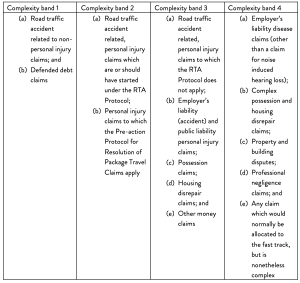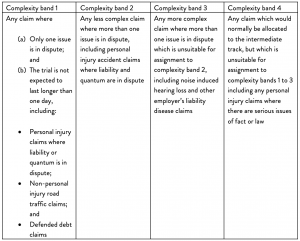19th July 2023
What are the cost changes to civil litigation from October 2023?
The fixed recoverable costs regime is due to extend to most civil cases from 1 October 2023. This is following the recommendations from Sir Rupert Jackson in 2017 and a Ministry of Justice consultation on the report in 2019. Currently, fixed costs only apply in a limited amount of scenarios, however this is to be extended to cover more cases. I am going to explore what the current rules are relating to fixed recoverable costs and how this is due to change.
Who pays what in civil litigation cases?
The general rule is that the unsuccessful party will be ordered to the pay the reasonable costs of the successful party.
What are fixed recoverable costs?
Fixed recoverable costs refers to the amount that a successful party can claim back in relation to their legal fees as awarded by the court. These costs are prescribed by statute and they are not open to challenge by a paying party. This is different from the amount that your solicitor may charge for the fees incurred whilst working on your matter. Often, a solicitor’s costs will be higher than the legal fees awarded by the court.
What are the tracks in civil litigation and what can be claimed back in relation to legal costs?
Small Claims Track
This track is for claims that are under £10,000 and less complex, often where the instruction of a solicitor is not necessary. It has a less procedural nature than the other tracks and is designed so it can be easily used by litigants in person. Generally, the only costs that are recoverable are court fees.
Fast track
The fast track is designed for claims that are in between the amounts of £10,000 to £25,000 and for matters that are more complex. For example, personal injury claims and housing claims valued at more than £1,500 will usually be assigned to the fast track as they are viewed as having a higher complexity. The fixed cost regime mostly applies in the fast track.
Multi-track
The multi-track is generally for claims exceeding £25,000 and highly complicated cases. In this track the successful party can claim legal costs back from the unsuccessful party.
What are the changes?
The fixed costs regime only applies in a limited number of cases. This is set to change with the new rules that are going to be introduced, which extends when the regime applies. The fast track is going to be changed so that there are four complexity bands (1 to 4 in ascending order of complexity) which will have fixed recoverable costs associated with each of them. The parties will be encouraged to agree the complexity band and have stated either the agreed band or claimed band in their directions questionnaire. However, the court may assign the case to a different band if it deems it to be appropriate. The table below demonstrates the various bands.

There will be a new track introduced which is called the intermediate track. This will cover claims that are valued between £25,000 to £100,000 and therefore will replace the multi-track for the aforementioned values. Similarly, as set out above, there will be four bands that the case will be assigned to based on complexity which will determine the costs recoverable. The same rules apply in regards to the parties selecting the complexity band. The table below outlines the various bands:

The new rules will give the courts flexibility to vary the fixed costs in each case to ensure that the new regime is fair and proportionate.
Can my monetary claim still be allocated to the multi track despite it being worth less than £100,000?
The short answer is yes. There are a series of factors the court will consider when deciding whether to allocate it to the multi track. These are when the court considers:
- The length of the trial is likely to be more than three days
- Oral expert evidence at trial is likely to exceed 2 experts per party
- The claim will not be justly and proportionately managed under the Intermediate Track
- There are additional factors which would make the claim inappropriate for the Intermediate Track
What are various parties’ views on the changes?
There has been considerable debate on the changes and what they mean for both parties in a claim.
Advantages
From an unsuccessful party’s perspective these changes provide a level of security on the legal costs that can be paid to a successful party.
Disadvantages
From a successful party’s point of view, they often will have to pay more to their solicitors than the costs they can recover from the unsuccessful party. This may potentially lead to less claimants wanting to instruct solicitors if the amount that they can recover in relation to their legal fees is limited and it may also create conflict between solicitors and clients over their bills.
Furthermore, more arguments between parties are likely to take place over track allocation and complexity bands. Parties may try and argue that a case falls within the multi-track (even if it clearly doesn’t) in order to try and avoid falling within the fixed costs regime.
We are yet to see the impact these changes will have, but there is no doubt that over the next few years they will change the nature of civil litigation.
